Stinging Insect & Carpenter Bee Control Services in Lancaster & Harrisburg, PA
Protecting Your Property from Unwanted Insects
There are quite of few stinging insects that can invade structures and landscape beds around them. Stinging insect control is first achieved by identifying the species of insect present. The trained expert will be able to determine the best course of action for wasp, carpenter bee, or yellow jacket control. In most cases these pests are easily controlled by an experience pest control technician. Stinging Insect Control is included in our Quarterly Pest Control Program. One-Time services for some stinging insects can be purchased, but carry limited warranties for very specific nest locations, making the Quarterly program more desirable for people having multiple pest control issues each year.
Honey Bees
Please note, if you have a swarm of Honey Bees, these must be collected by a Beekeeper as Tomlinson Bomberger will not treat these protected insects. To find a Beekeeper in Lancaster, Lebanon, York, or Dauphin County, PA area click here.


Carpenter Bee
Here in central PA, we get a lot of calls about carpenter bees doing damage to homes and commercial properties. This bee resembles a bumble bee, but the upper surface of their abdomen is bare and shiny black, versus that of a bumble bee which is hairy and has yellow markings. In late spring and early summer these bees hover outside of structures looking for locations to bore holes for nesting and egg laying. Although they will fly towards people and animals, these bees rarely sting. They will most likely bore holes into soft, unsealed wood. Burrows can be individually treated by a trained professional. Filling holes and sealing wood with thick paint or sealants will help to deter activity. Although reduction of these pests is possible, most situations call for multiple years of treatment.
Bald Face Hornet
This large, aggressive black and white hornet, 5/8 – 3/4″ long, gets its name from its white face. They are social insects that live in aerial nests made of processed cellulose. A mature nest reaches a peak of 500 – 800 workers by late summer / early fall. The workers are sterile females that are capable of stinging. The nests are not re-used the following season, and fertile queens overwinter under tree bark and in warm areas under siding and around window and door frames. This is a beneficial species that controls other pests but becomes a nuisance if its’ nests overlap areas of human activity. Control should be completed by a trained, properly equipped pest professional.
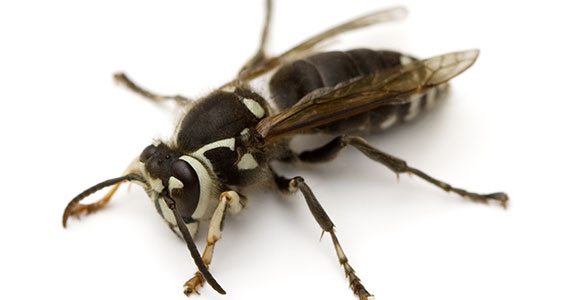
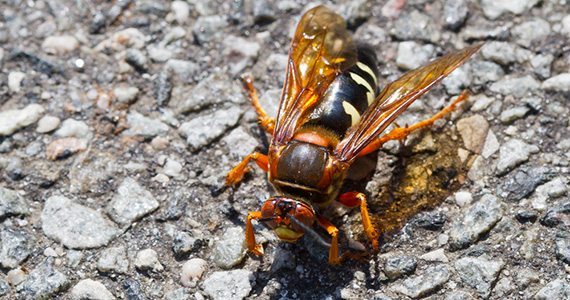
Cicada Killer
This large wasp, 1 – 1 5/8″ long, hunts for cicadas, which it paralyzes with its sting and delivers it to its nest. They dig a nest in the ground, kicking out large amounts of soil in the process. Their appearance is frightening, as they resemble over-sized yellow jackets. Females can sting, but rarely do unless stepped on or provoked. Males will “buzz” people to warn them away, but cannot sting. Females usually choose bare ground to dig their nests, so keeping a healthy lawn is a first step in prevention. Treatment for nests can be performed for reduction, but this pest is very difficult to manage since they build solitary nests versus dwelling in colony locations.
European Hornet
This large hornet, 3/4 – 1 3/8″ long gets its name from being introduced from Europe around the year 1840. Their color is brown with yellow abdominal stripes and a pale face. Their paper nests are brown, because they make the paper from decayed wood. Mature nests contain 200 – 400 workers, and are often built high in attics, barns, garages, and other protected areas including wall voids. The workers prey on a variety of insects. Workers may also girdle small shrubs to get at the sap, which can cause the plant to die. The males and workers will fly at night, and “bump” into lit windows, trying to follow the light source. Control should be left to trained, properly equipped professionals.

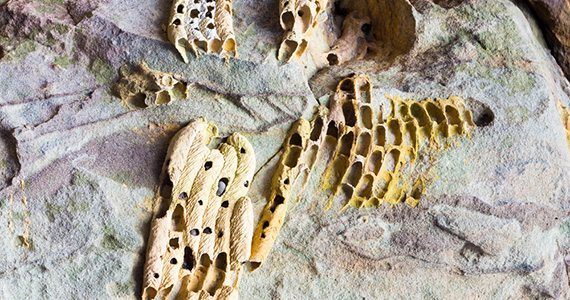
Mud Dauber
The clever nests this pest makes from mud gives it its name. The adults are identified by a long, slender waist. These are solitary wasps that do not live in colonies. Females construct the mud nests, which resemble the pipes of an organ. Each cell is provisioned with spiders she has paralyzed with her venom. They do not defend their nests, and rarely sting. Nests are constructed in sheltered areas under eaves, in attics and garages, etc. These beneficial insects, which help control spiders, are best controlled by simply scraping down any nests. If pesticides need to be used, they should be administered by a trained professional.
Paper Wasp
The semi-social, stinging pest gets its name from the paper-like nests they produce from chewing wood fibers into pulp. Their nests resemble umbrellas in their shape. These rather docile wasps become aggressive if their nests are disturbed. Control of any stinging pest should be left to a trained professional.
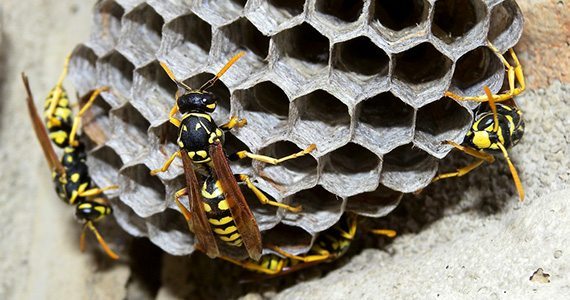
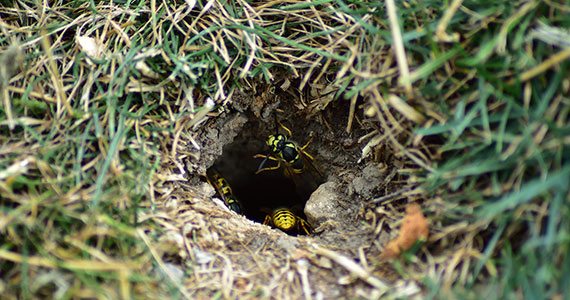
Yellow Jacket
Their distinctive yellow and black coloring gives this stinging social insect its name. The workers, which are all female, will readily deliver a powerful sting. Their paper-covered nests are often underground, or may be built in wall voids, attics, crawl spaces, and in bushes & shrubs, with the population exceeding 5000 workers by late summer. Control should only be attempted by a trained professional wearing appropriate protective gear.
"As always, your technician continues to do a thorough, efficient job. He is a delight to talk with, and we look forward to his visits!"
Carole J. | Lancaster, PA
"I'd like to say how much I was impressed on the first visit and application of pest control. I think the applicator did a fine job and explained what he was doing. I’m looking forward to doing business in the future. I'm impressed with the tapes and traps instead of all the sprays inside the house. Thanks again for a good job."
John G. | Mount Joy, PA
"You may be certain that I always recommend your company with enthusiasm whenever someone asks me why my lawn looks so good. It is good to know in this age of cynicism that there are still firms committed to providing excellent service performed by conscientious and skilled workers."
Richard M. | Elizabethtown, PA
